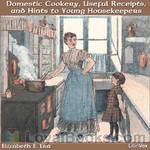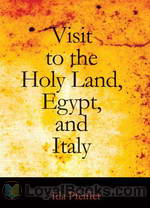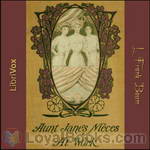|
Books Should Be Free Loyal Books Free Public Domain Audiobooks & eBook Downloads |
|
|
Books Should Be Free Loyal Books Free Public Domain Audiobooks & eBook Downloads |
|
Top Authors |
|---|
|
Book type:
Sort by:
|
By: Elizabeth E. Lea (1793-1858) | |
|---|---|
 Domestic Cookery, Useful Receipts, and Hints to Young Housekeepers
Domestic Cookery, Useful Receipts, and Hints to Young Housekeepers
The compiler of [this book] having entered early in life upon a train of duties, was frequently embarrassed by her ignorance of domestic affairs. For, whilst receipt books for elegant preparations were often seen, those connected with the ordinary, but far more useful part of household duties, were not easily procured; thus situated, she applied to persons of experience, and embodied the information collected in a book, to which, since years have matured her judgment, she has added much that is the result of her own experiments... | |
By: Friedrich Nietzsche (1844-1900) | |
|---|---|
 Case of Wagner / Nietzsche Contra Wagner / Selected Aphorisms
Case of Wagner / Nietzsche Contra Wagner / Selected Aphorisms
A collection of three of Nietzsche's writings concerning the music of Wagner. In particular, he relates Wagner's music as degenerate, unrefined and unintelligent and relates it to a gradually degenerating German culture and society. The translator provides a detailed introduction. | |
By: Friedrich Wilhelm Nietzsche (1844-1900) | |
|---|---|
 Homer and Classical Philology
Homer and Classical Philology
| |
 We Philologists Complete Works of Friedrich Nietzsche, Volume 8
We Philologists Complete Works of Friedrich Nietzsche, Volume 8
| |
 Thoughts out of Season Part I
Thoughts out of Season Part I
| |
By: Hilaire Belloc (1870-1953) | |
|---|---|
 The French Revolution
The French Revolution
“It is, for that matter, self-evident that if one community decides in one fashion, another, also sovereign, in the opposite fashion, both cannot be right. Reasoning men have also protested, and justly, against the conception that what a majority in numbers, or even (what is more compelling still) a unanimity of decision in a community may order, may not only be wrong but may be something which that community has no authority to order since, though it possesses a civil and temporal authority, it acts against that ultimate authority which is its own consciousness of right... | |
 Europe and the Faith
Europe and the Faith
The Catholic brings to history (when I say "history" in these pages I mean the history of Christendom) self-knowledge. As a man in the confessional accuses himself of what he knows to be true and what other people cannot judge, so a Catholic, talking of the united European civilization, when he blames it, blames it for motives and for acts which are his own. He himself could have done those things in person. He is not relatively right in his blame, he is absolutely right. As a man can testify to his own motive so can the Catholic testify to unjust, irrelevant, or ignorant conceptions of the European story; for he knows why and how it proceeded... | |
 First and Last
First and Last
“When a man weighs anchor in a little ship or a large one he does a jolly thing! He cuts himself off and he starts for freedom and for the chance of things. He pulls the jib a-weather, he leans to her slowly pulling round, he sees the wind getting into the mainsail, and he feels that she feels the helm. He has her on a slant of the wind, and he makes out between the harbour piers.” (quotation from Hilaire Belloc) | |
 On Something
On Something
“Now that story is a symbol, and tells the truth. We see some one thing in this world, and suddenly it becomes particular and sacramental; a woman and a child, a man at evening, a troop of soldiers; we hear notes of music, we smell the smell that went with a passed time, or we discover after the long night a shaft of light upon the tops of the hills at morning: there is a resurrection, and we are refreshed and renewed.” – Hilaire Belloc | |
 On Nothing & Kindred Subjects
On Nothing & Kindred Subjects
“I knew a man once, Maurice, who was at Oxford for three years, and after that went down with no degree. At College, while his friends were seeking for Truth in funny brown German Philosophies, Sham Religions, stinking bottles and identical equations, he was lying on his back in Eynsham meadows thinking of Nothing, and got the Truth by this parallel road of his much more quickly than did they by theirs; for the asses are still seeking, mildly disputing, and, in a cultivated manner, following the... | |
 Cautionary Tales for Children
Cautionary Tales for Children
| |
 The Free Press
The Free Press
I propose to discuss in what follows the evil of the great modern Capitalist Press, its function in vitiating and misinforming opinion and in putting power into ignoble hands; its correction by the formation of small independent organs, and the probably increasing effect of these last. (Introduction by Hilaire Belloc) | |
 The Bad Child's Book of Beasts
The Bad Child's Book of Beasts
| |
 The Path to Rome
The Path to Rome
| |
 Hills and the Sea
Hills and the Sea
| |
 More Beasts (For Worse Children)
More Beasts (For Worse Children)
| |
 Waterloo
Waterloo
| |
 A General Sketch of the European War The First Phase
A General Sketch of the European War The First Phase
| |
 More Peers : Verses
More Peers : Verses
| |
 The Battle of Blenheim
The Battle of Blenheim
| |
 Crécy
Crécy
| |
 The Historic Thames
The Historic Thames
| |
 Malplaquet
Malplaquet
| |
 Poitiers
Poitiers
| |
 Avril Being Essays on the Poetry of the French Renaissance
Avril Being Essays on the Poetry of the French Renaissance
| |
 Tourcoing
Tourcoing
| |
By: Ida Laura Pfeiffer | |
|---|---|
 A Visit to the Holy Land, Egypt, and Italy
A Visit to the Holy Land, Egypt, and Italy
Ida Pfeiffer travelled alone in an era when women didn’t travel. She went first on a pilgrimage to the Holy Land, then went on to Egypt and Italy. Understanding the difficulties a woman would face travelling alone and on a budget, she made a will before she left. Go she did, however; and upon her return she wrote this book. She used the proceeds to finance her next trip – six months in Iceland. | |
By: L. Frank Baum (1856-1919) | |
|---|---|
 Aunt Jane's Nieces at Work
Aunt Jane's Nieces at Work
The novel carries forward the continuing story of the three cousins Louise Merrick, Beth De Graf, and Patsy Doyle, and their circle. The title is somewhat misleading; it could more accurately have been called Aunt Jane's Nieces in Politics. (Uncle John Merrick tells his nieces that politics is "work," which yields the title.)The story begins three days after the end of the previous book, Aunt Jane's Nieces at Millville; the freckled and red-haired Patsy still sports a sunburn from her summer in the Adirondacks... | |
 A Kidnapped Santa Claus
A Kidnapped Santa Claus
| |
 The Woggle-Bug Book
The Woggle-Bug Book
| |
 Aunt Jane's Nieces Out West
Aunt Jane's Nieces Out West
After visiting Louise, Arthur and Toodlums at their ranch in Southern California, Beth and Patsy, together with Uncle John, decide to spend the winter at an hotel in the little village of Hollywood, where they get drawn into the new motion picture industry. New friends, adventures and mysteries await. | |
 Policeman Bluejay
Policeman Bluejay
This is another "TWINKLE TALE" from Mr. Baum (written under the pen name Laura Bancroft) and celebrates the further adventures of Twinkle and Chubbins as they magically become child-larks and live the exciting, and often dangerous, life of birds in the forest. | |